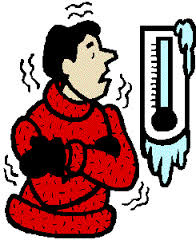Being outside in the frigidly cold weather is almost never fun, especially now that the Polar Vortex has made a return visit. But because snow falls when it wants and doesn’t always differentiate between comfortably and uncomfortably cold weather, using your Toro or Ariens snow blower to clear off the drive may have potentially serious consequences.
Cold Weather Effects
Humans are not constitutionally composed for very cold weather, but we’ve managed to adapt. And while we may be aware of the effects that cold weather has on the human body are nothing new, ignoring them is never a good idea. Here’s what happens when the temperature drops, and how the body tries to defend itself:

.

.
Next time you take out your Toro or Ariens snow blower during really cold weather, evaluate how important it is to clear every inch of your driveway in terms of the potential impact it can have on your health and maybe choose to only clear the sidewalk until it warms up a bit. But when the mercury does finally rise, make sure you’ve got one of Snow Blower Source’s Toro or Ariens snow blowers, and enjoy free shipping to the lower 48 states.









